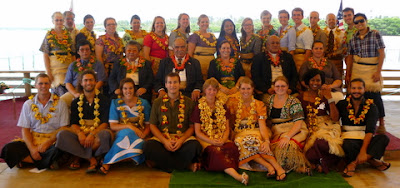Peace Corps Tonga has just sworn in its 76th group of volunteers. 26 bright shining faces have joined the ranks that have served the Kingdom over the past 43 years. We celebrated with them yesterday as they completed their 2 ½ months of training with a lovely ceremony here in Nuku'alofa. It is with hope and enthusiasm that we say “hello” to our new compatriots.
Arrivals and departures are a hallmark of Peace Corps service. Just over a year ago we said goodbye to family, friends, jobs, communities—our life in the States—to say hello to our new life as PCVs in Tonga. Our first hellos were to our fellow Group 75 trainees in Los Angeles, followed in a few days by hellos to the Peace Corps staff who support us, and to some of the Group 73 volunteers we would soon be replacing. These hellos soon became goodbyes as these folks completed their service and left before we really had much of a chance to get to know them.
As we settled into our sites and began our work assignments, we started to get to know our Group 74 colleagues who were beginning their second year of service. As we served alongside these folks, we gained respect and appreciation for the work they were doing and became good friends with a few. Over the past few weeks we have been saying goodbye to these friends as they completed their service. It's been especially hard to say goodbye to our closest Group 74 friends and neighbors, Melanie and Eric.
We met Melanie and Eric when they were relocated from an outer island in Ha'apai to Nuku'alofa (see previous post). They moved into a house near us, and since then we've shared many meals, trips to the beach, and long conversations together. As primary teachers Kathy and Melanie are kindred spirits, and Eric and I provided each other with motivation for our early morning work-outs: getting up at 5:30 a.m. and going to the gym 3 times a week. Our first trip to Pangaimotu was a result of their encouragement, and, again, with their encouragement, we even ventured out to the infamous Billfish nightclub.
On the day of their departure from the Kingdom, Kathy wrote the following “Ode to Melanie.”
The past few days have felt like Christmas at our house as our PC colleagues, neighbors and friends, Melanie and Eric, have undertaken final preparations for departure. But rather than Worcestershire sauce, a Christmas tree, myriad art supplies, camp chairs, or even Nestle's semi-sweet chocolate morsels, I'd still rather have Melanie.
I met Melanie about 10 months ago when she and Eric wer moved from their outer island site to the main island of Tongatapu. And, while she and Eric were devastated about having to leave their small island where they were happy, fully invested, and looking forward to a successful second year, they approached their new assignments with the “can do” spirit typical of their upper midwest upbringing.
Melanie, in her assignment as an English teacher at a nearby primary school, once again took an empty concrete block room and turned it into a haven for children's academic and expressive pursuits. As time passed, the children came to know and trust that their thoughts and opinions would be respected, their work products valued, and they would be free from harm. They were safe to explore and create when in Melanie's environs.
For Melanie and Eric, Peace Corps was always about service. Melanie shared with me a mantra that she had adopted when faced with yet another Tongan conundrum: “I'm doin' it for Jesus.” This statement, in its simplicity, sums up Melanie's motivation. Her service to the people of Tonga was completely selfless; her service originated in a deep and profound love for people, all people, and her love of God.
Melanie, while young chronologically speaking, is wise beyond her years. With a journalism background, she took on the challenge of teaching with an open mind and open heart. When faced with the rote recitation methodology prevalent in the Tongan education system, her heart and mind, rather than an educational philosophy supported by a teaching credential or degree, told her to pursue a more reasoned and reasonable approach. As a result Melanie implemented an intact and sound pedagogy. She is a gifted natural educator.
I have great respect for Melanie and I value the few months I was fortunate enough to spend time with her. Her optimism and enthusiasm are boundless. She truly exemplifies the adage that “hope springs eternal.” Her heart for service, giving all of herself to the people of Tonga, continues to inspire me. Her passion and patience left friendships and a legacy that will long be remembered.
As dozens of people lined up to throw good bye parties, bestow blessings, and shower gifts on Melanie and Eric I chose to express my heartfelt sadness by writing this “Ode to Melanie.” Thank you, Melanie, for shining your light so brightly in my life. I really would rather have you than Nestle's semi-sweet chocolate morsels.
So as Eric and Melanie are adjusting to their new lives back home in the frigid Mid-West, we are beginning some fine new friendships with volunteers from Group 76 and looking forward to our week of training next month which will reunite us with our Group 75 colleagues from the other islands. Once again, we'll be saying hello and then good-bye again as we go our respective ways to begin our second year of service. And then next October, it will be hello to Group 77 as we prepare our good-byes to Tonga.




































